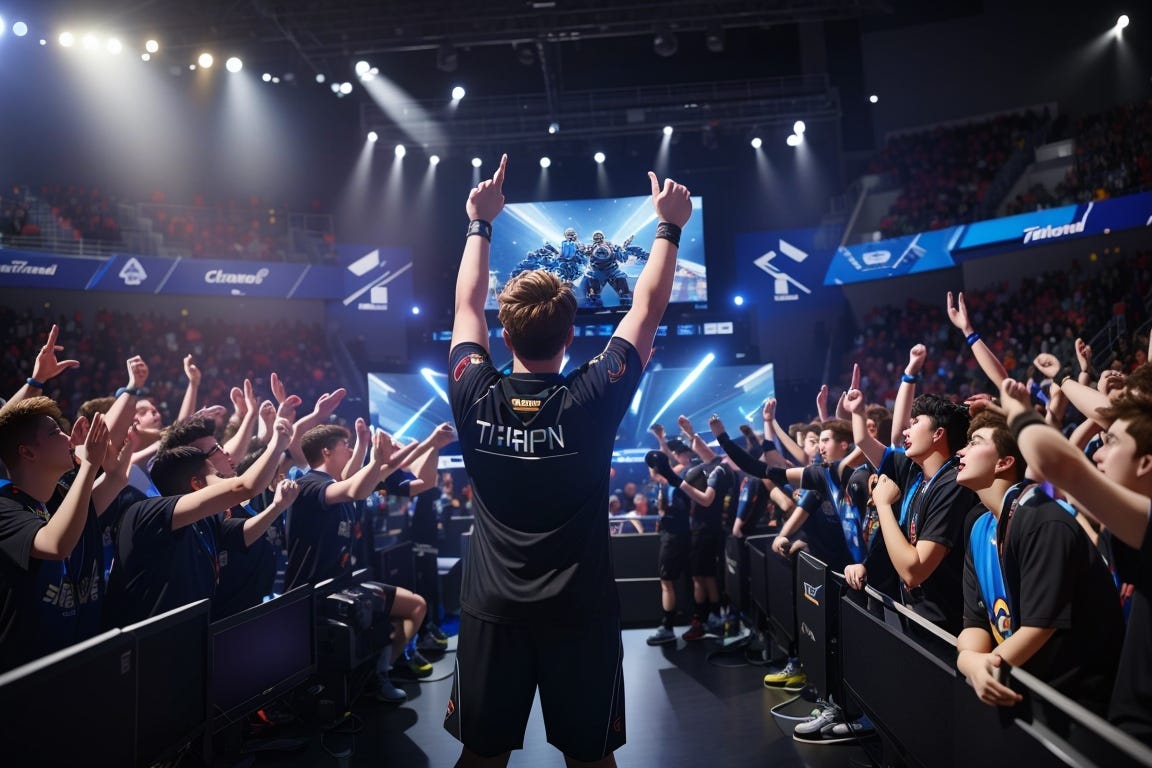The Rise of Esports: Online Gaming’s Competitive Edge

Esports has transformed from a niche hobby into a global phenomenon, capturing the imagination of millions of fans worldwide. The competitive gaming industry has evolved rapidly, with technological advancements, professional leagues, and lucrative sponsorships reshaping the landscape. Online gaming’s competitive edge now plays a pivotal role in its mainstream success. In this article, we will delve deep into the evolution of esports, its current state, and the various factors contributing to its massive growth.
The Evolution of Esports: A Competitive Gaming Revolution
Esports, or electronic sports, refers to organized multiplayer video game competitions, particularly between professional players, individually or as teams. Initially, gaming was seen as a solitary or casual activity. However, as internet connectivity improved and online gaming platforms gained traction, competitive gaming began to take shape.
Early Beginnings of Competitive Gaming
The roots of esports can be traced back to the late 1990s and early 2000s, where gaming tournaments started to emerge. Games like Quake, StarCraft, and Warcraft attracted dedicated players who competed in local LAN (Local Area Network) events. These early tournaments were crucial in establishing a competitive scene, even though they were relatively small-scale.
As broadband internet became more widely accessible, online sports betting such as Counter-Strike, Dota 2, and League of Legends provided the perfect platform for players to compete globally. These games introduced innovative game mechanics, strategic depth, and online communities, which laid the foundation for the modern esports ecosystem.
The Rise of Professional Leagues and Tournaments
By the mid-2000s, esports had begun to see more professional structures emerge. Major tournaments like the World Cyber Games (WCG) and Electronic Sports World Cup (ESWC) began offering large cash prizes and garnered significant media attention. These tournaments attracted sponsors, media networks, and enthusiasts, setting the stage for the commercialization of esports.
Today, esports boasts major leagues and tournaments such as the League of Legends World Championship, The International (for Dota 2), and Overwatch League. These events bring together the best teams and players from around the world, showcasing incredible skill and offering multimillion-dollar prize pools.
Esports and its Growing Popularity
The Impact of Streaming and Content Creation
One of the major drivers behind the rise of esports is the explosive growth of streaming platforms like Twitch, YouTube Gaming, and Facebook Gaming. These platforms allow gamers to stream their gameplay live, engage with their audiences in real-time, and create content around their gaming experiences.
Streamers, who often serve as influencers within the esports community, contribute significantly to the industry’s growth. Many top-tier players, like Ninja, Shroud, and Pokimane, have made their names by streaming popular esports titles, amassing millions of followers in the process. Streaming has not only helped players build brands but also connected fans to the heart of competitive gaming. Viewers now have the ability to watch tournaments in real-time, learn from the pros, and interact with the global esports community.
Sponsorships, Brand Partnerships, and Media Rights
Esports’ meteoric rise in popularity has attracted significant investment from major brands and companies. Sponsorship deals with global brands such as Coca-Cola, Intel, and Red Bull are now commonplace, with companies eager to tap into the lucrative gaming market. Esports sponsorships provide brands with access to a highly engaged, tech-savvy audience that aligns with their products.
In addition to sponsorships, media rights have become a key revenue stream for esports organizations. Streaming platforms and networks pay substantial amounts to broadcast major esports tournaments. These broadcasting deals mirror those found in traditional sports, further legitimizing esports as a global competitive spectacle.
Esports as a Career Path
With the rise of professional gaming, esports has become a viable career for many talented players. Professional gamers now earn substantial incomes through prize winnings, sponsorships, streaming revenue, and social media endorsements. Not only do they have the opportunity to compete in high-stakes tournaments, but they also can build long-term careers by diversifying into content creation, coaching, and even team ownership.
The creation of esports academies and dedicated training programs is further cementing the career potential within the industry. Players can now receive structured training, improve their gameplay, and network within the esports community. These academies focus on cultivating the next generation of top-tier professional gamers, ensuring a sustainable pipeline of talent for the growing industry.
The Competitive Edge: Why Esports Thrives in Online Gaming
Access to Global Competitions
One of the key advantages of esports is the accessibility it offers players from across the world. Unlike traditional sports, which require physical presence for competitions, esports competitions can be held online, allowing players from any part of the world to compete against each other. This removes geographic barriers and expands the player base, fostering a more inclusive and diverse community.
Online platforms enable instant matchmaking, where players can find opponents of similar skill levels, making the experience of competitive gaming seamless and engaging. The ability to play from the comfort of one’s home, while still participating in global tournaments, is a major selling point for the esports community.
Technology and Game Development Innovation
Advancements in gaming technology have played a crucial role in elevating esports. The development of high-performance gaming hardware, such as GPUs, fast internet connections, and gaming peripherals, has improved the gaming experience, allowing for smoother gameplay and better performance.
Game developers also continuously enhance their games to be more spectator-friendly. Many esports titles now feature spectator modes, integrated live statistics, and commentary options, ensuring that fans can follow the action from any angle and stay engaged throughout a match. This has been instrumental in boosting the viewership of esports tournaments.
A Thriving Ecosystem of Fans and Communities
Esports thrives on the dedication and passion of its fan base. Esports fans are among the most loyal and engaged of any entertainment industry, following their favorite teams, players, and tournaments with unmatched enthusiasm. These fans often form tight-knit communities around their favorite games, creating an ecosystem of content creators, influencers, and commentators.
The sense of belonging and engagement that fans feel in these communities is a significant part of what makes esports unique. Whether it’s discussing strategies on social media platforms, watching live streams, or attending live events, the interaction between players and fans is integral to the competitive gaming experience.
The Future of Esports: What’s Next?
The future of esports looks incredibly bright, with continuous advancements in technology, the expansion of competitive leagues, and increasing recognition from mainstream media. Esports is positioning itself as a dominant force in the entertainment industry, competing with traditional sports for attention and investment.
Incorporating Esports into Traditional Sports
As esports continues to gain recognition, there has been a growing trend of traditional sports organizations integrating esports into their portfolio. Teams from major leagues like the NBA and NFL have invested in esports, creating esports divisions and teams to compete in popular titles like FIFA and NBA 2K. This collaboration between traditional and digital sports may redefine how fans engage with competitive gaming in the future.
The Growth of Mobile Esports
The rise of mobile gaming is another avenue where esports is poised to expand. Titles like PUBG Mobile, Mobile Legends, and Clash Royale are gaining massive traction in mobile esports competitions. With the global mobile gaming market expanding rapidly, mobile esports could become a significant part of the industry’s future, attracting even more players and viewers worldwide.
Conclusion
The rise of esports is a testament to the growing popularity and cultural significance of online gaming. Its competitive edge lies in its accessibility, the innovation of game development, and the passionate, global community that supports it. As esports continues to evolve, the potential for future growth and integration into mainstream entertainment is limitless.



